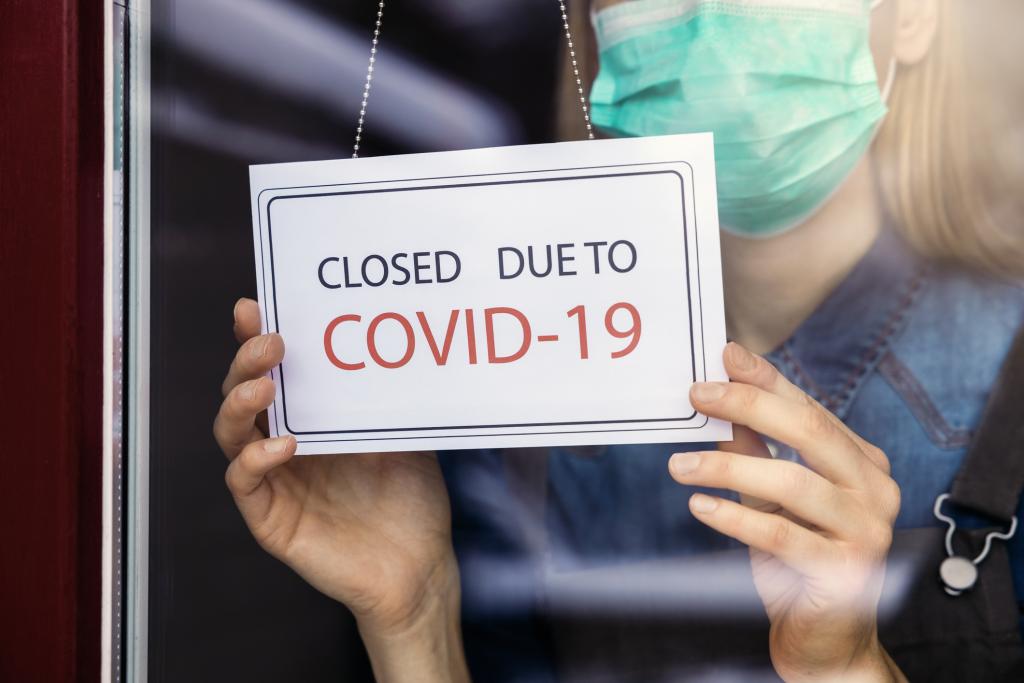
Whilst the Prime Minister has been clear that the restrictions of the most recent lockdown should end on 19 July 2021, the possibility of having to close your workplace due to Covid-19 remains a real possibility even after this date.
The Coronavirus Job Retention Scheme (CJRS) has begun tapering off, making this an uncertain time for businesses especially if they face the need to close temporarily due to Covid-19. This article looks at the options available should a business need to close.
When might you need to close your workplace?
Certain sectors including retail, hospitality and transportation have faced substantial difficulties in recruiting and hardly a day goes by without hearing of a business that has had to close or limit its services due to staff shortages.
Equally, there could still be times when a business is instructed by public health to close. Alternatively, it could be that you carry out a risk assessment and conclude that it is unsafe to open.
What are your legal responsibilities to employees?
Your responsibilities to employees will be dictated by the terms of their contract of employment. The underlying legal position is that an employee must be given work for the hours they are contracted for and paid for those hours.
If you have employees who are on contracts which do not guarantee a minimum number of hours, then arguably you are not contracted to provide them with any work or pay for that work. You should however be mindful that it is what happens in practice which truly dictates the terms of an employee’s contract of employment. Therefore, if they work regular hours they might have an implied contractual right to those hours – even if the contract asserts that they have no rights in that regard.
The starting position is that even if you must close you must provide your employees with pay in respect of the hours they are contracted for. We will explore some options that might be open to you and might provide you with support during the period you are closed.
Can you temporarily lay off staff?
If you have the appropriate contractual clause then you might be in a position to temporarily lay off your staff while you close your workplace. It is vital that the ability to lay off is enshrined as a contractual term, simply having reference to it within a policy will not be sufficient.
Briefly, laying off employees would mean that you would provide them with no work and no pay for a period of time. During this period of time the individual will remain your employee. This is a temporary solution and after a set period of time an employee could claim a statutory redundancy payment (SRP) from you. They can also claim statutory guarantee payments – although these are minimal.
You can serve counter notice to a claim for SRP if you have a reasonable expectation of returning to normal working within four weeks of the date of the employees notice to claim SRP. You can find a detailed article in relation to lay off here.
Can you furlough employees and claim through the CJRS?
The bottom line in relation to the current furlough scheme is that you need business reasons, linked to Covid-19, in order to lawfully make claims through the CJRS. Provided that the workplace closure is as a clear direct result of Covid-19 then it would appear permissible that you could make claims through the CJRS but only for eligible employees.
It is important to remember that you do not have a unilateral right to place employees on furlough – you do need their agreement and to comply with the requirements of the scheme.
More details can be found in relation to the scheme requirements here.
What if employees are self-isolating or off sick?
The government has been clear that the current CJRS should not be used for short term absences or to cover periods of self-isolation. If an individual is required to self-isolate, then they should be paid statutory sick pay (SSP) (unless their contractual sick pay entitlement is drafted widely enough to capture such an event). If an individual is off sick because of Covid-19 then they should be paid sick pay in line with their contractual rights.
You might be able to recover SSP paid to employees who have to self-isolate – you can you check if you can claim here.
What if you have to close your workplace because staff are self-isolating?
Based on the current guidance our understanding is that the individuals who have to self-isolate or are off sick should be paid in line with the above. Clearly, this potentially might lead to different employees being treated differently, as not all will be self-isolating.
The employees who do not have to self-isolate could potentially be furloughed and entitled to a higher rate of pay than those who are only receiving SSP, due to their self-isolation. Equally, if you have the ability to lay off staff then those who are self-isolating will technically be better off on SSP than those employees who are then receiving no pay under your contractual lay off provision.
This disparity in treatment could lead to complaints from employees and also a considerable drop in employee morale/engagement. Unfortunately, our view at this time is that if individuals have to self-isolate who are off sick then you cannot furlough them and claim through the CJRS, without risking recovery action being instigated following any HMRC audit.
It is of course open to you to increase the pay individuals are receiving to ensure parity of terms across all employees. Any additional payments you agree could not be recovered through a Government scheme and, dependant on the business resources swallowing that loss, simply might not be possible.
If you are considering topping up pay you should ensure you take into account any one off support payments your employees will receive directly from the Government.
Ultimately your key concern will need to be survivability of the business but if it is possible to ensure parity of terms then this will help the business to grow on the other side as employees will be more engaged.
If any of the individuals who are on lower pay could potentially argue that it is because of a disability, then this will require very careful consideration – to ensure a discrimination claim could not be brought. Take advice on this if you are not sure.
If you do have to close your workplace, is there any financial help available?
We are currently unaware of any direct support available for businesses which have to close as a result of Covid-19. However, this will depend on your individual circumstances and you should use the Government’s useful tool for ascertaining what support is available to you. The Government tool can be found here.
You can also contact the Government’s business support helpline for free on 0800 998 1098 or talk to an advisor via Webchat here.
